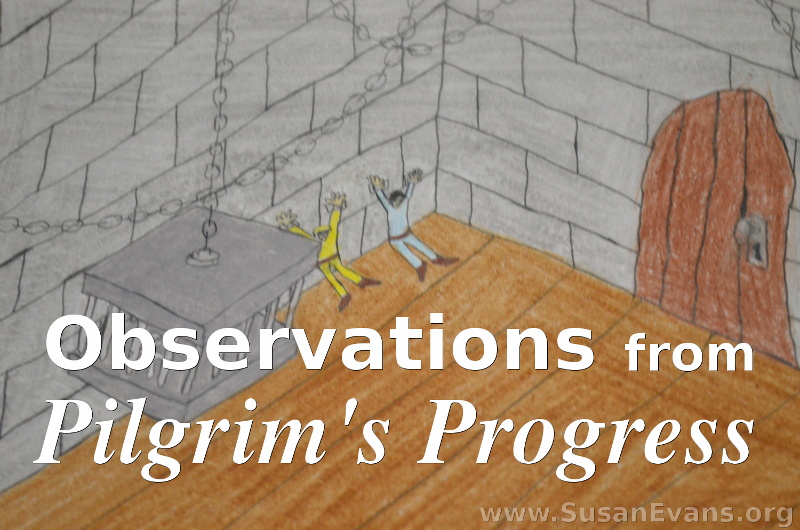As my children and I listened to Pilgrim’s Progress on audio, we made some observations that apply to our modern Christian lives:
Pilgrim’s Progress: Observation #1
Christian felt a huge burden and was groaning under sorrow of soul. He knew that his city was headed for destruction, but instead of people listening to him, they dismissed what he said.
Pilgrim’s Progress: Observation #2
You may sink into Despondency if you take your eyes off the Light.
Pilgrim’s Progress: Observation #3
To get rid of the consciousness of sin, you can either go to God in repentance, or you can listen to human reasoning (called Worldly Wise), which will sear your conscience to make you feel better about your sin without dealing with it.
Pilgrim’s Progress: Observation #4
The giants in your life aren’t real. Trust that God’s Word is true, and you will overcome.
Pilgrim’s Progress: Observation #5
Sloth and other pilgrims were asleep and didn’t realize their danger. They refused to get up and move forward in their Christian life. No amount of reasoning would cause them to pursue the right Way because they already decided that it was too hard.
Pilgrim’s Progress: Observation #6
To fail one test in your life is to make more difficult the next test.
Pilgrim’s Progress: Observation #7
How to overcome sin: as soon as you’re conscious of it, turn away from it immediately!
Pilgrim’s Progress: Observation #8
If you refuse to repent of a tiny sin, it will become bigger. The tiny sin is already big because you are choosing it instead of Christ. If you didn’t love your tiny sin more than Christ, you would have repented of it.
Pilgrim’s Progress: Observation #9
Pilgrims do not have armor on their backs. If they do not stand their ground, they will be defeated.
Pilgrim’s Progress: Observation #10
When fighting the Dragon, Christian became weaker and weaker because of his wounds. The Sword of the Spirit was helpful at the last minute when he thought he could fight no more, and he gave the Dragon a mortal blow with Scripture. The Dragon fled.
Pilgrim’s Progress: Observation #11
A wicked voice came up behind Christian, whispering suggestions in his ear, which he thought proceeded from his own mind. This tormented poor Christian and worried him more than anything he had met with before.
Pilgrim’s Progress: Observation #12
A Talkative man loves to answer doctrinal questions, but if his knowledge of Scripture is not accompanied by action, it is useless. He is unteachable because he knows more about Scripture than others, so all he wants to do is talk. He leads many to stumble as they only look at the Scriptures as information.
Pilgrim’s Progress: Observation #13
If a man considers a sin profitable to himself and harmless to others, he will not give it up, even if he is offending God.
Pilgrim’s Progress: Observation #14
Money-love made it seem godly to devote one’s life to making money because he would be a good steward to enjoy what God had given him. Christian pointed out that silver weighs you down and prevents you from running the race. Money-love would not listen but had many worldly excuses for pursuing money.
Pilgrim’s Progress: Observation #15
The Master sent people two by two so that they could be an encouragement to each other and keep each other from deception.
Pilgrim’s Progress: Observation #16
The longer they were in Doubt, the more their discouragement increased and deepened. As soon as the Light shone on their cell, the giant called Despair had to leave. Despair hates the Light.
Hopefully these practical applications of Pilgrim’s Progress will help you in your personal walk with the Lord. My children and I enjoyed studying this book, and we were relieved when Christian finally reached the Celestial City!










